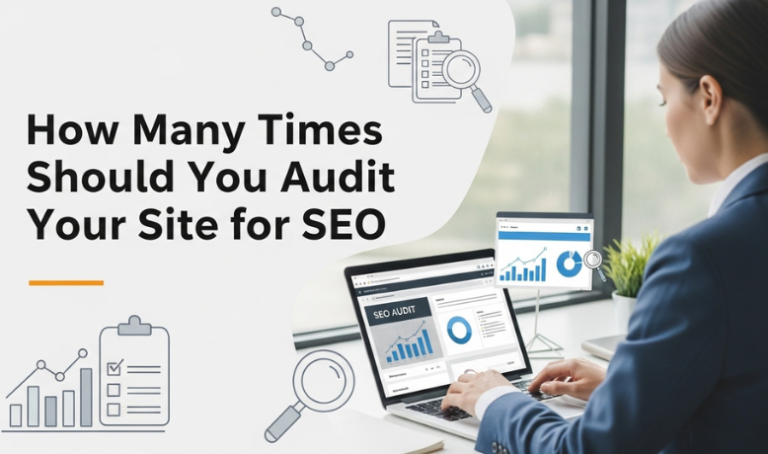In the fast-paced world of digital marketing, SEO is a vital element that can determine the success of your website. However, simply optimising your site once is not enough. SEO requires continuous monitoring and fine-tuning to maintain and improve your rankings on search engines like Google. This is where regular SEO audits come in.
An SEO audit is a comprehensive analysis of your website’s health and performance, helping you identify issues that could be affecting your search rankings. From broken links to poor mobile performance, audits help uncover hidden problems that may go unnoticed but could significantly impact your visibility.
Table of Contents
ToggleWhy SEO Audits Matter
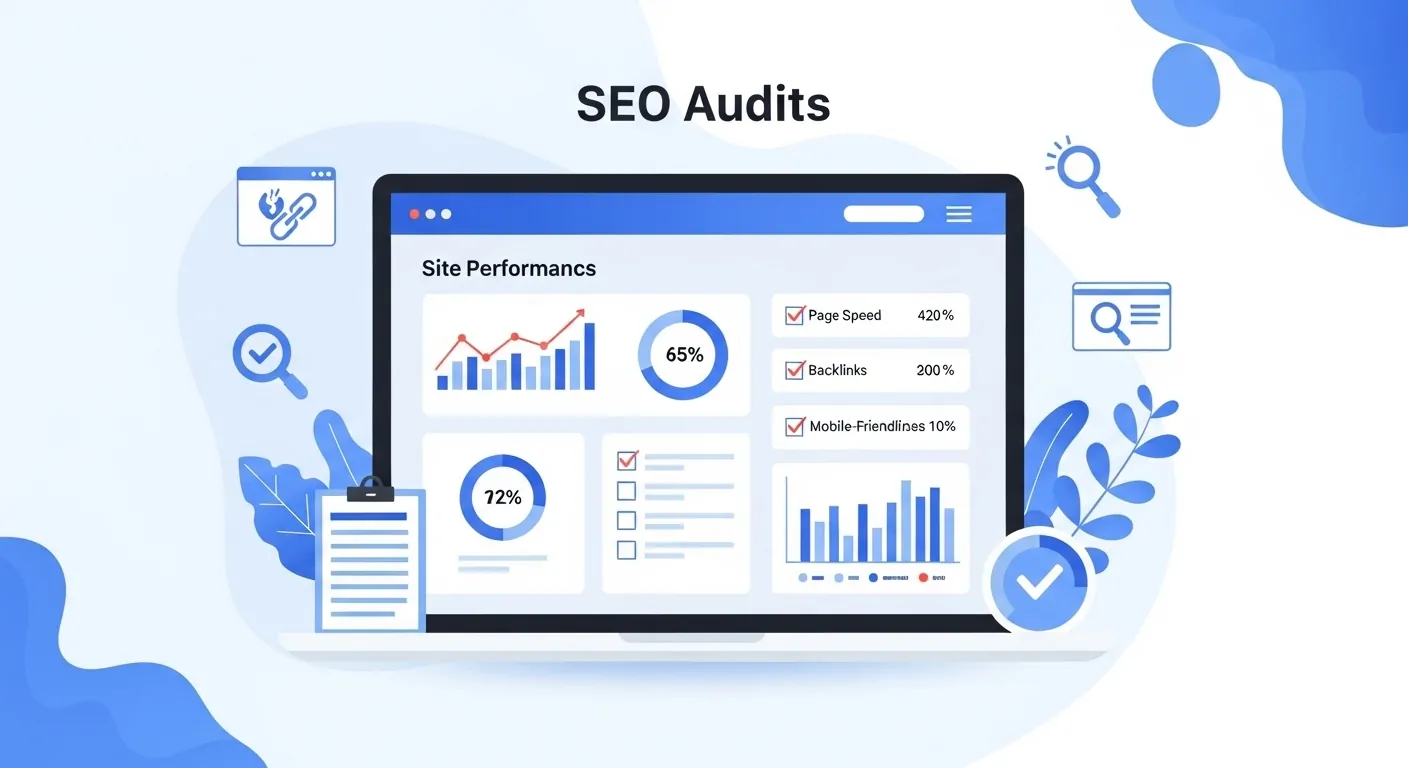
An SEO audit is crucial in ensuring your website remains optimised for search engines and users. It’s not just about fixing minor issues; it’s about taking a holistic view of your website’s performance and identifying opportunities for improvement that could have a lasting impact on your rankings and visibility.
Identify Issues Affecting Performance
SEO audits help pinpoint problems such as slow page load times, broken links, or poor mobile responsiveness, which can negatively impact user experience and search engine rankings. Addressing these issues promptly ensures your site is accessible and attractive to users and search engines.
Improve Search Engine Rankings
An SEO audit analyses factors like keyword usage, meta tags, and backlinks to reveal areas for optimisation that can lead to higher search engine rankings. Regular audits ensure that your site adapts to ever-changing search algorithms and continues to perform well in search results.
Enhance User Experience

SEO is not just about ranking higher; it’s about providing value to your audience. Regular audits help improve the user experience by optimising site navigation, content structure, and mobile responsiveness. A well-optimised site leads to better engagement, reduced bounce rates, and higher conversions.
Stay Competitive
The digital landscape is constantly evolving, with competitors continuously optimising their sites. SEO audits help you stay ahead of the curve by identifying emerging trends, new keywords, or changes in your industry that may affect your rankings. By performing regular audits, you can adjust your strategy to stay competitive.
When to Conduct SEO Audits (Frequency)
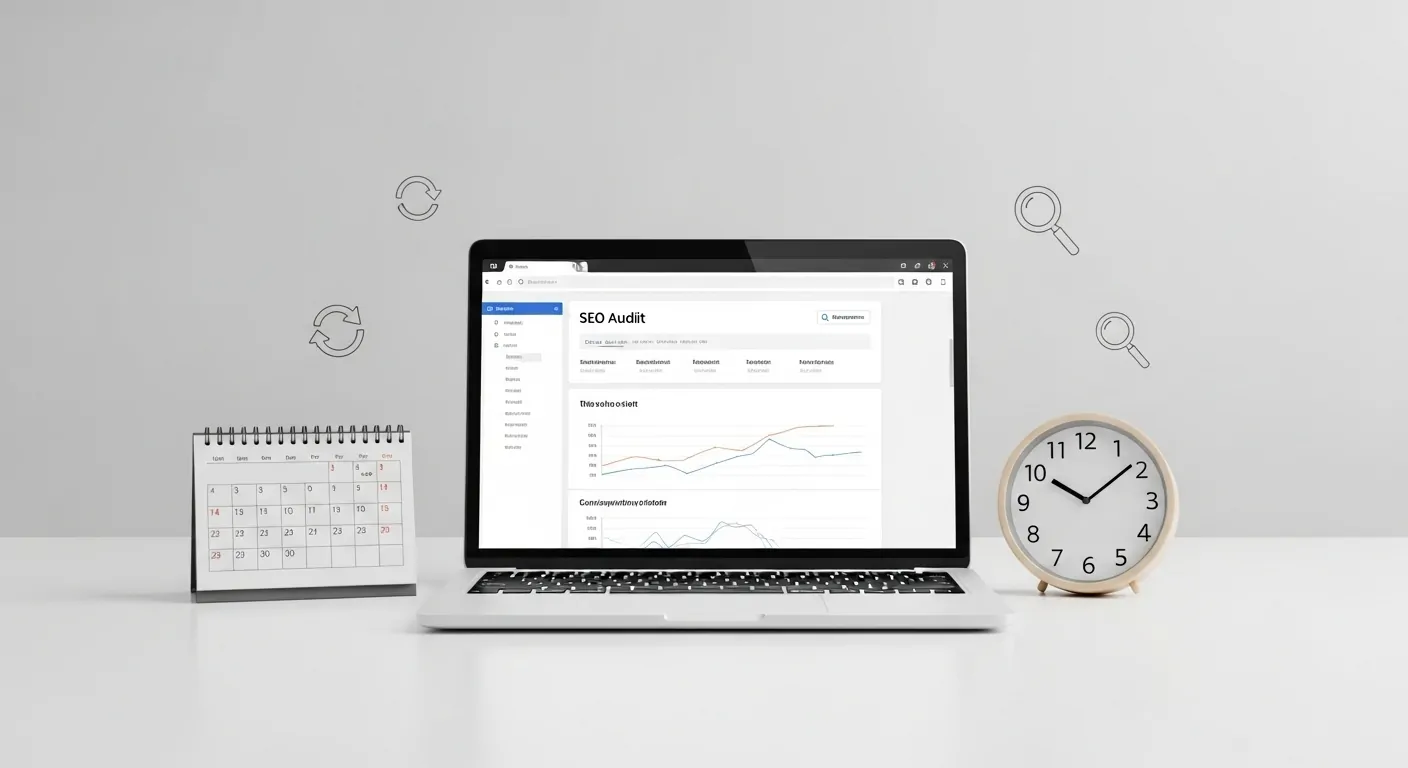
Determining how often you should conduct an SEO audit depends on several factors related to the dynamics of your website, industry, and the changing landscape of search engine algorithms. Here are some key triggers that will help you decide when it’s time to perform an audit:
After Major Algorithm Updates
Search engines like Google are constantly updating their algorithms, which can have a significant impact on your website’s rankings. These updates are often designed to improve search result accuracy, penalise spammy practices, or reward high-quality content. Whenever a major update occurs, it’s essential to audit your site to ensure it complies with the new guidelines and identify any potential issues that might cause a drop in rankings.
- How Often: Quarterly, or immediately after a major algorithm update.
- Why: Staying aligned with Google’s latest standards helps maintain or improve rankings.
After Website Redesign or Significant Changes
Any major changes made to your website—whether it’s a redesign, content updates, or new features—can impact your SEO. These changes might affect technical aspects such as site speed, URL structures, internal linking, and mobile optimisation. Performing an SEO audit after significant changes helps ensure that the new version of your site is still optimised for both users and search engines.
- How Often: After each major website overhaul or redesign.
- Why: To ensure no SEO issues were introduced during changes to the site.
Significant Drops in Traffic or Rankings
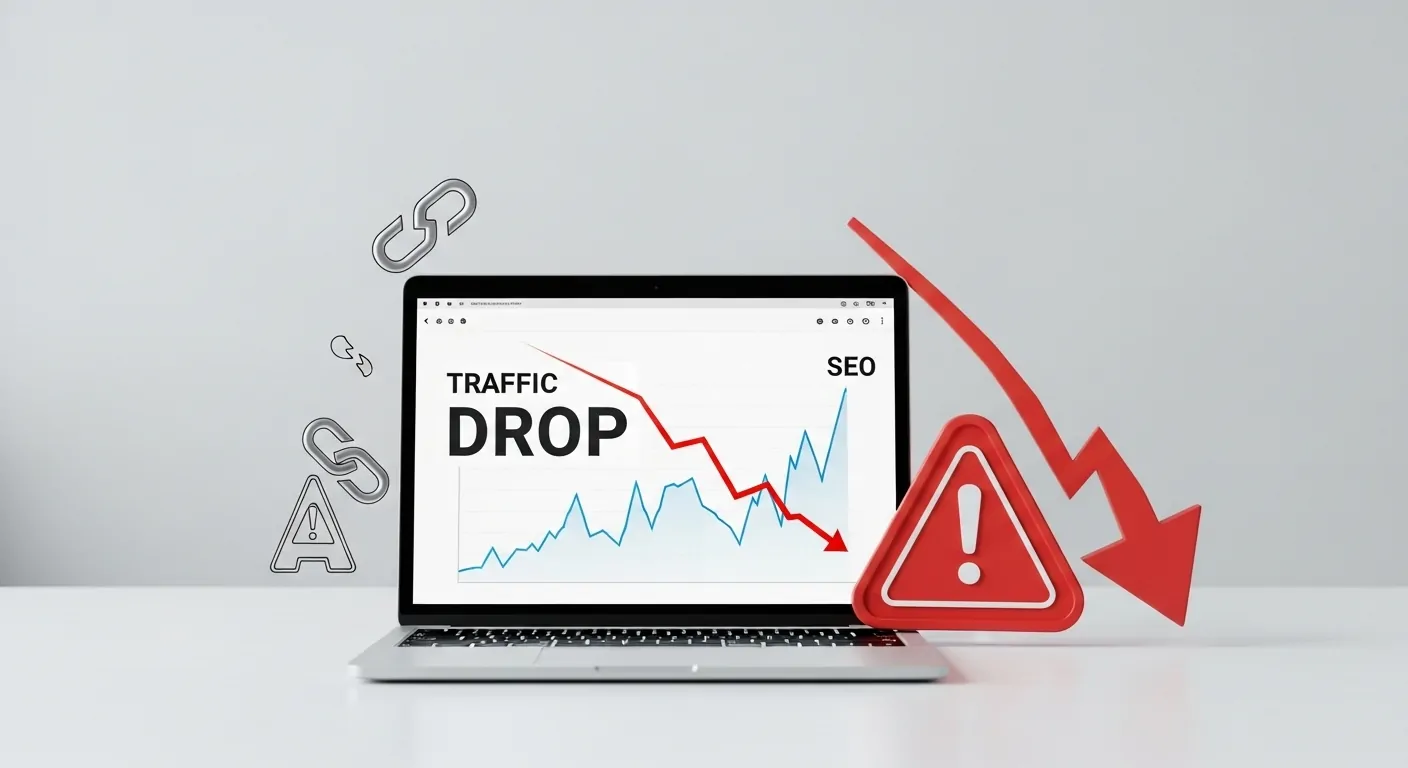
If you notice a sudden drop in organic traffic or keyword rankings, it’s time for an audit. A sharp decline in traffic might indicate a technical issue, penalty, or an SEO aspect that needs attention. By auditing your site, you can quickly identify and fix the root cause of the decline, potentially recovering your rankings.
- How Often: As soon as there’s a noticeable drop in traffic or rankings.
- Why: To identify and resolve issues that are hurting site performance.
Competitive Pressure or Industry Changes
SEO is highly competitive, and your rivals are likely constantly optimising their sites to rank higher. If there’s a significant shift in your industry, such as new competitors entering the market or changes in consumer behaviour, an SEO audit helps you stay competitive. Regular audits help you adapt to industry trends, discover new keywords, and ensure your content remains relevant.
- How Often: Annually or when significant changes in your industry occur.
- Why: Ensure your SEO strategy aligns with current trends and stays ahead of competitors.
Seasonality or Promotional Campaigns
For businesses with seasonal trends or special promotions, SEO audits help ensure that their sites are optimised for those specific periods. For example, retail businesses might want to optimise their sites for increased holiday traffic, while service-oriented businesses may need to adjust keywords for peak seasons. Conducting an audit before high-traffic periods ensures that your site is ready to capture as much relevant search traffic as possible.
- How Often: At the start of each new season or before a promotional campaign.
- Why: To optimise for seasonal or event-driven traffic spikes.
Regular Maintenance (Ongoing Audits)
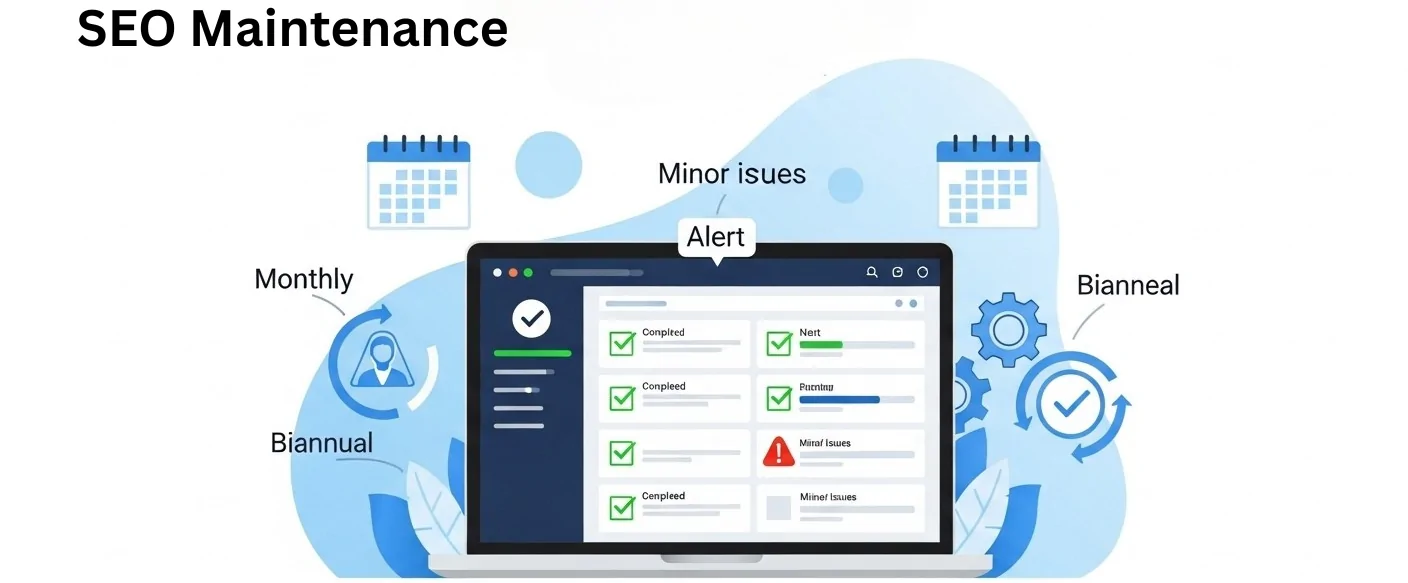
While specific events trigger major audits, ongoing audits should be part of your regular SEO maintenance. Periodic audits—whether monthly, quarterly, or biannually—help keep your site in top condition by addressing minor issues before they snowball into major problems. These regular checks ensure that your site stays optimised continuously without waiting for problems to become critical.
- How Often: Monthly, quarterly, or biannually, depending on the size and complexity of the site.
- Why: To stay proactive and maintain ongoing optimisation.
Types of SEO Audits You Should Perform
Performing an SEO audit is not a one-size-fits-all approach; different aspects of your website require specialised audits to address specific issues. Here are the key types of SEO audits you should consider to ensure your website is fully optimised:
Technical SEO Audit
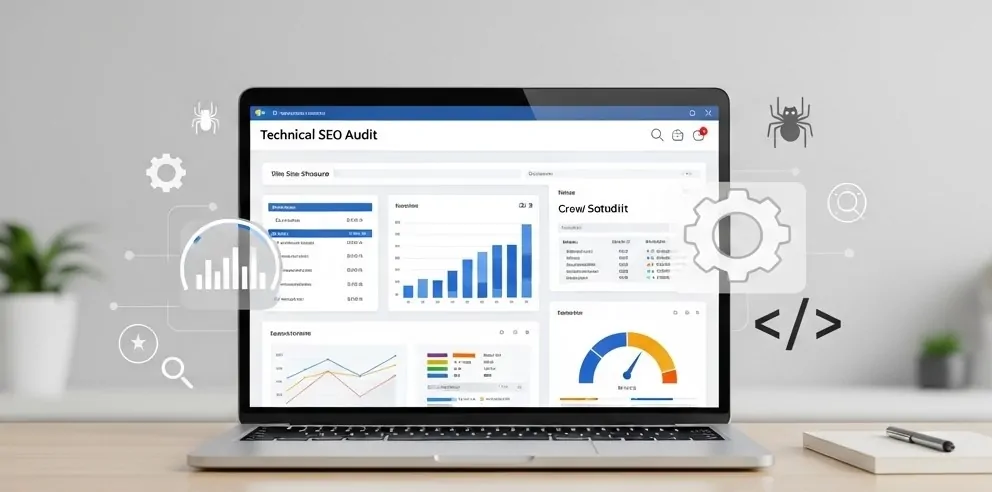
A technical SEO audit focuses on your website’s underlying structure and performance. This audit examines factors influencing how search engines crawl, index, and render your site. Common issues identified in a technical SEO audit include:
- Crawlability & Indexability: Ensuring search engines can crawl and index all your important pages without any hindrances.
- Site Speed & Performance: Checking loading times and optimising for faster performance, as speed is a key ranking factor.
- Mobile Responsiveness: Verifying your site is mobile-friendly, given the increasing importance of mobile-first indexing.
- XML Sitemaps & Robots.txt: Ensure your sitemaps are properly configured and that robots.txt does not block important content from being crawled.
- 404 Errors & Broken Links: Identify and fix any broken links or missing pages that may harm user experience and SEO performance.
Why It’s Important: A technically sound website ensures that search engines can access and understand your content, improving the chances of better rankings and a better user experience.
On-Page SEO Audit
On-page SEO refers to optimising individual pages on your website for relevant keywords and ensuring they are aligned with search intent. A thorough on-page audit covers the following:
- Title Tags & Meta Descriptions: Checking that title tags and meta descriptions are unique, compelling, and keyword-optimised.
- Header Tags (H1, H2, etc.): Ensuring proper use of header tags to structure content for readability and SEO.
- Keyword Optimisation: Verifying that each page targets the right keywords and uses them naturally within the content.
- Internal Linking: Ensuring internal links are strategically placed to guide users and help search engines discover new content.
- Content Quality & Relevance: Assess the overall quality of your content to ensure it’s useful, relevant, and informative for your target audience.
Why It’s Important: On-page SEO is vital for improving the visibility of individual pages and aligning your content with search engine algorithms and user intent.
Content Audit
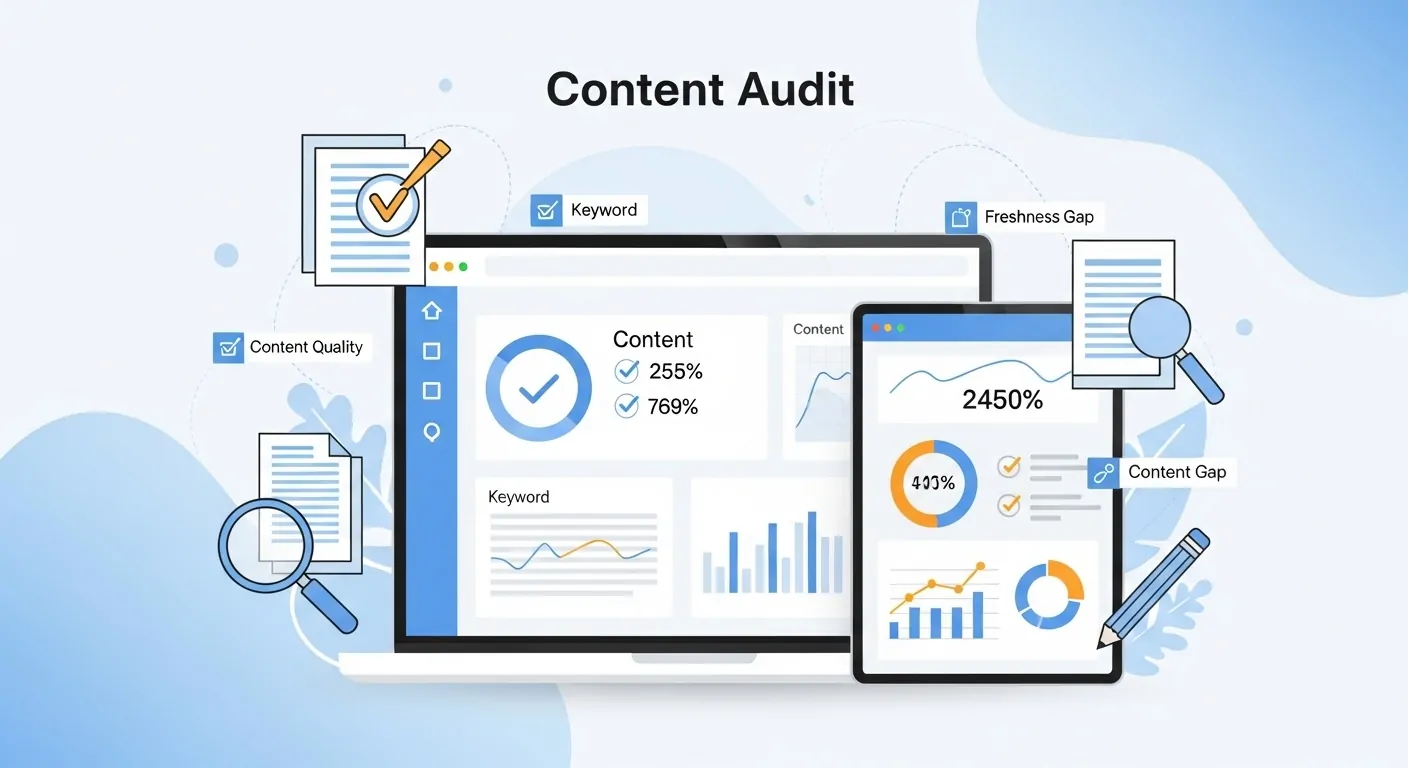
A content audit assesses the quality, relevance, and performance of the content on your website. This audit involves:
- Content Quality: Reviewing content to ensure it’s original, informative, and adds value to users.
- Keyword Usage: Analysing the effectiveness of your keyword strategy and ensuring your content targets the right search terms.
- Content Freshness: Identifying outdated content that may need to be updated or removed.
- Content Gaps: Finding topics or keywords your website has not addressed provides opportunities for new content creation.
- Engagement Metrics: Analysing how users interact with your content (e.g., bounce rates, time on page) to identify areas of improvement.
Why It’s Important: High-quality, relevant content is key to attracting and retaining users and achieving higher rankings in search engines.
Backlink Audit
Backlinks are one of the most important ranking factors for SEO. A backlink audit evaluates the quality and quantity of backlinks pointing to your site. Key elements to review in a backlink audit include:
- Link Quality: Ensuring backlinks come from authoritative, relevant websites in your industry.
- Anchor Text Optimisation: Verifying that anchor text is diverse and optimised for keywords.
- Toxic Backlinks: Identifying any harmful backlinks from spammy or low-quality sites that could hurt your rankings.
- Link Velocity: Analysing the natural growth of backlinks over time to ensure no sudden spike could raise flags with search engines.
Why It’s Important: Backlinks improve domain authority and search rankings. A backlink audit helps you focus on high-quality, relevant links while disavowing harmful ones.
Local SEO Audit (If Applicable)
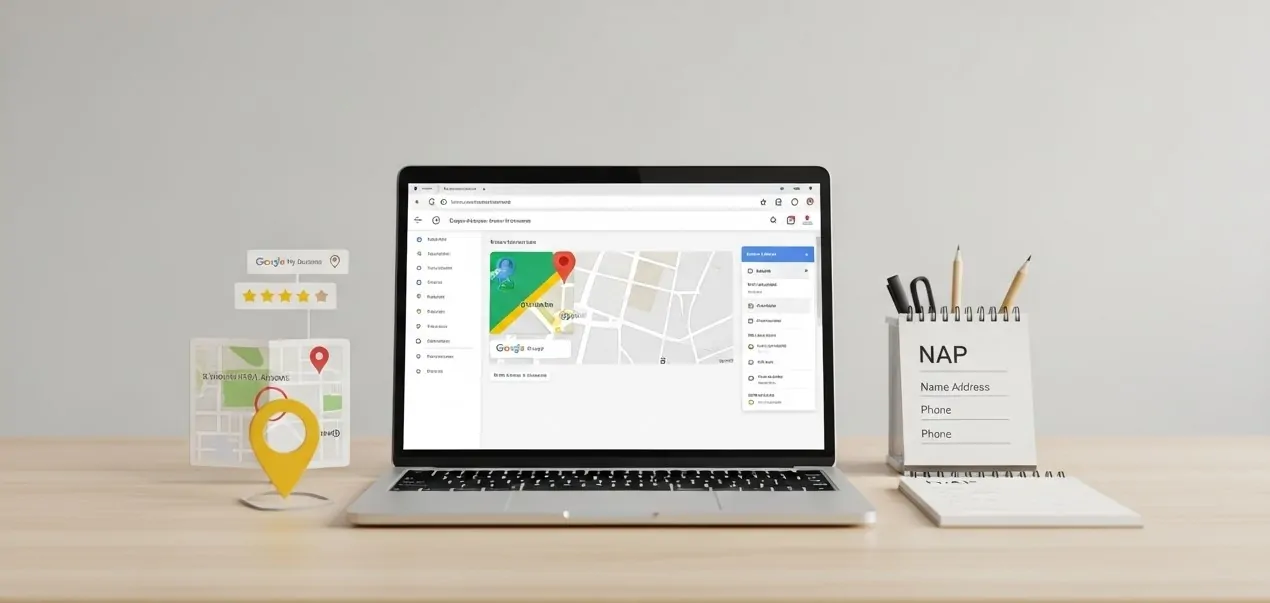
For businesses that rely on local customers, a local SEO audit ensures your website is optimised for local search results. Key areas to focus on include:
- Google My Business Profile: Verifying and optimising your Google My Business (GMB) listing to ensure it’s accurate and current.
- NAP Consistency: Ensuring your Name, Address, and Phone number (NAP) are consistent across all online listings and directories.
- Local Keywords: Identifying and targeting keywords with local intent, such as “best pizza in [city].”
- Local Reviews & Citations: Managing reviews and citations from local directories to improve local search rankings.
Tools to Use for SEO Audits
To conduct a thorough SEO audit, leveraging the right tools can make the process more efficient and accurate. Several SEO audit tools are available, each offering unique features to help you analyse different aspects of your website. Here’s a list of popular tools and how they can assist in your SEO audits:
Google Search Console
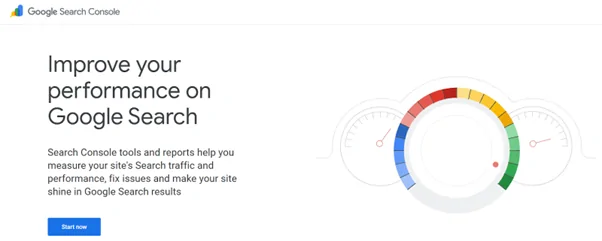
Purpose: Google Search Console is a free tool provided by Google to monitor and maintain your website’s presence in search results. It’s essential to perform technical SEO audits and track how Google crawls and indexes your site.
Key Features:
- Crawl errors: Identifies broken links, pages with crawl issues, and blocked resources.
- Search Analytics: Shows how your site is performing in search results, including click-through rates (CTR), average rankings, and impressions.
- Mobile Usability: Identifies issues with your site’s mobile-friendliness.
Sitemap submission: Allows you to submit and monitor sitemaps for better indexing.
Why It’s Important: Google Search Console provides insights directly from Google, making it invaluable for understanding how Google views your site and helping you identify any technical SEO issues.
SEMrush

Purpose: SEMrush is an all-in-one marketing tool that provides comprehensive SEO analysis, including on-page SEO, backlinks, site health, and keyword tracking. It’s a great tool for conducting both site-wide and competitive audits.
Key Features:
- Site Audit: Scans your website for SEO issues like broken links, page speed, and mobile usability.
- Keyword Research: Identifies keywords your site is ranking for and opportunities for optimisation.
- Backlink Audit: Evaluates the quality of backlinks pointing to your site.
- Competitor Analysis: Allows you to see how your competitors perform and uncover strategies to improve your rankings.
Why It’s Important: SEMrush offers a detailed view of your site’s SEO health and competitive landscape, making improving your strategy based on comprehensive data easier.
Ahrefs

Purpose: Ahrefs is among the most popular SEO tools for backlink analysis and competitor research. It also provides a powerful site audit tool for identifying on-page and technical SEO issues.
Key Features:
- Site Audit: This service provides a thorough audit of your site’s technical and on-page SEO, highlighting issues and offering solutions.
- Backlink Analysis: Identifies the quality and quantity of backlinks pointing to your site, helping you improve link-building strategies.
- Content Explorer: Let’s you find top-performing content in your niche, helping you create better content.
- Rank Tracker: Tracks your keyword rankings over time.
Why It’s Important: Ahrefs excels at backlink analysis, which is crucial for understanding your site’s authority and identifying areas to improve your backlink profile.
Screaming Frog

Purpose: Screaming Frog is a website crawler that helps you analyse your site’s technical SEO aspects in-depth. It’s particularly useful for large sites with complex structures.
Key Features:
- Site Crawling: Crawls your entire site and generates reports on key technical SEO elements like internal linking, page titles, and meta descriptions.
- Broken Links: Identifies 404 errors and redirects, helping you fix broken links.
- Duplicate Content: Finds duplicate content and pages with similar or identical titles.
- XML Sitemap Generation: Creates an XML sitemap for better indexing by search engines.
Why It’s Important: Screaming Frog is ideal for technical SEO audits, especially for large websites, as it offers a detailed analysis of site structure and identifies common issues that can impact SEO.
Moz Pro
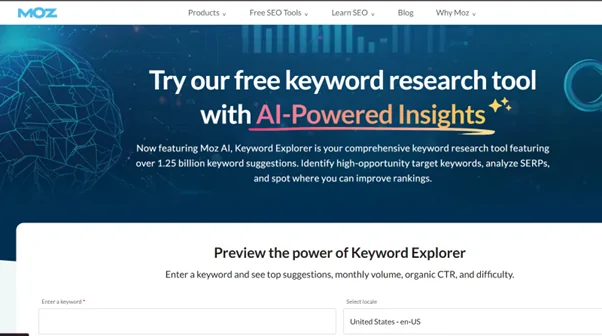
Purpose: Moz Pro is a comprehensive SEO suite that offers tools for keyword research, site auditing, backlink analysis, and rank tracking.
Key Features:
- Site Crawler: This tool scans your site for common SEO issues, such as missing meta tags, duplicate content, and broken links.
- Keyword Explorer: Helps you find new keyword opportunities and track your current rankings.
- Backlink Analysis: Identifies backlink opportunities and evaluates the quality of existing links.
- On-Page Optimisation: Suggest improving on-page elements like title tags and meta descriptions.
Why It’s Important: Moz Pro is user-friendly and offers an all-in-one solution for SEO audits, making it great for beginners and advanced users.
Google Analytics

Purpose: Google Analytics is primarily a traffic and performance analysis tool, but it can also help you identify SEO-related issues by showing how users interact with your site and which pages are performing well.
Key Features:
- Traffic Insights: Shows which pages are getting the most organic traffic and which need optimisation.
- Bounce Rate & Session Duration: Helps you identify pages that may have issues with engagement or user experience.
- Acquisition Data: Shows how visitors are finding your site (organic search, paid search, referrals, etc.), helping you analyse SEO performance.
Why It’s Important: While not strictly an SEO tool, Google Analytics provides crucial insights into user behaviour and traffic sources, which can help you assess the effectiveness of your SEO efforts.
Ubersuggest
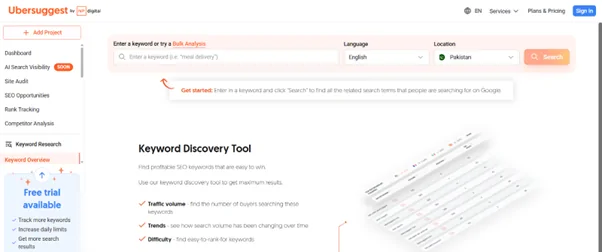
Purpose: Ubersuggest is a free SEO tool with keyword research, site audit, and competitor analysis features. It’s a more budget-friendly alternative to tools like SEMrush and Ahrefs.
Key Features:
- Site Audit: Provides a comprehensive audit of your site’s SEO health, highlighting issues that need attention.
- Keyword Suggestions: Helps you find new keyword opportunities for content creation and optimisation.
- Backlink Data: Shows the backlinks pointing to your site and identifies potential areas for improvement.
- Rank Tracking: Tracks your website’s keyword rankings over time.
Why It’s Important: Ubersuggest is great for users looking for a cost-effective SEO audit tool that covers key areas like technical SEO, keywords, and backlinks.
Conclusion
Regular SEO audits are essential for maintaining a website’s health, optimising performance, and staying competitive in search rankings. By conducting audits on key elements like technical SEO, content, backlinks, and on-page factors at appropriate frequencies, you can identify issues early, improve user experience, and adapt to changes in search engine algorithms. Whether it’s monthly checks for technical issues or quarterly content reviews, staying proactive with SEO audits ensures that your site remains optimised for search engines and users, ultimately driving better traffic, engagement, and conversions.

